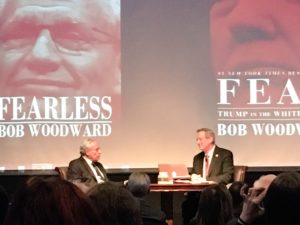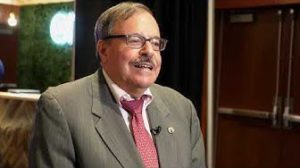30 January 2019 (Paris, France) — The end of January is always the busiest part of the year for me and my media team because we cover four back-to-back (actually simultaneous) events: the World Economic Forum annual meeting in Davos, Switzerland; the International Cybersecurity Forum in Lille, France; Legaltech in New York; and the Computers, Privacy and Data Protection conference in Brussels, Belgium.
And this year I did something a little different. The media teams I sent to Lille and New York also had a graphics/production team. So we were able to produce videos and distribute them as the event progressed. in Lille we sent out “same day” posts and videos via Twitter and my blog. At Legaltech we have done the same, sending out 12 video Tweets today for e-discovery vendors to drive traffic to their booths, with 5 more in the queue. And now, in this post, a few snippets from our chats today with Judge Peck and Craig Ball. First up: Craig Ball.
Craig launched Legalweek on Monday with his brilliant Fireside chat with Bob Woodward at a ceremony honoring outstanding achievement, an event sponsored by Zapproved called “Ediscovery Heroes” which is now it its third year.
For the newbies, Craig Ball is a trial lawyer, computer forensic examiner, law professor, noted authority on electronic evidence … and the pen behind the award-winning “Ball in Your Court” column on electronic discovery. He is one of the most respected brainiacs in the industry.
And, in fact, he agreed to become the fourth member of our new video series “The ones to watch”, a look at the brainiacs in the world of e-discovery and information governance.
Craig’s interview today knocked the socks off my video crew, and the many attendees at Legalweek who had a “first look” at our rough cut. He really tells it “like it is” on the current state of the e-discovery industry. In fact there is so much to digest we’ll need to make it a two-part series.
In the short clip below, Craig explains (in his now well-known and very well liked amusing way) how he got involved in law and technology — “to keep from going to jail” — starting with the building and programming of computers. And how it snowballed. One must admire his passion to share his knowledge of technology … by “speaking lawyer” … and dealing with lawyers who cannot seem to embrace technology.
He ends with a great “history of forensics in brief”, and how each of us is so “instrumented” … much like the astronauts of the past. And how that will have a profound affect on the law.
Again: this is just a taste of an incredible interview:
Next up, Judge Peck.
To my regular readers, Judge Andrew J. Peck needs no introduction. But for many of my new readers … and I will keep this very brief … Judge Peck was one of the most illustrious United States Magistrate Judges to grace the judiciary, at the forefront on discovery practice issues. He wrote many of the leading cases in that regard. After his retirement he joined DLA Piper as senior counsel in the New York office.
The following clip is just the tip of the iceberg from an incredible interview we conducted today. I had the honor of interviewing him two years ago at LawTech Europe in Brussels as the kick-off event for that conference and he was amazing. The knowledge and wisdom just did not stop.
In the clip below, Judge Peck puts us into the Waaaay Back Machine … to the 1990s … and outlines the slow introduction of email and other forms of electronic data entering into the litigation fray, with the development of “key word” search, which was in a way the first legal technology in the age of electronic e-discovery. But it was primitive and done poorly so he would issue an opinion on “how to do it right”. It would be the beginning of a series of opinions that would help us mould the proper procedures and applications for e-discovery. It would lead to his now famous opinion in Rio Tinto on technology-assisted review which had risen to prominence in e-discovery to become (not without controversy) the principle tool in the e-discovery practitioner’s toolkit.
And he reiterates “RULE #1” : make the whole process speedy and less expensive. So if the technology can be proven to work, be effective … let’s use it. And he ends with a cool explanation of Rule 34(b) and the notion of “boilerplate”.
Enjoy:


